Retailers around the world are seeing the impact of COVID-19 on their businesses, from store closures to unprecedented drops in sales. Although this temporary “new normal” has become accepted as a necessary step to slow the spread of the virus, many non-essential retailers have also adopted innovative new strategies that allow them to connect with shoppers, and in some cases, even to transact, during the lockdown period.
A prime example of this is Aptos customer Fast Fish, a family-run fast fashion retailer headquartered in Hangzhou, China that operates 2,400 stores and manages 14,000 employees. Here is the remarkable story of Fast Fish’s innovation and resiliency during the height of the COVID-19 crisis, as well as their eye to recovery as stores reopen in their region.
The Pandemic’s Timeline for Fast Fish
Some of the most illuminating insights provided by Fast Fish show the timeline of COVID-19 in China and the resulting impact on its business. The data shows that 10 weeks after the initial quarantine began, all of the retailer’s stores except those in Wuhan had re-opened. What’s more, Fast Fish saw sales reach 60–70 percent of the same time period last year as stores began reopening in week 10. Although this timeline won’t be an exact match for retailers across the world due to the difference of the virus’ impact on specific regions and varying governmental restrictions, it demonstrates that there is light at the end of the tunnel for retailers looking to get back to business.

Navigating Store Closures with WeChat
WeChat is a popular messaging, social media and mobile payment app in China. The app has 1.15 billion monthly active users and offers livestreaming functionality that retailers can leverage to sell products. The platform can also be used to quickly create WeChat Stores, which is a cost-effective way for many retailers in the country to create an ecommerce presence.
While storefronts were closed down, Fast Fish turned to WeChat’s livestreaming functionality to recoup sales. The company encouraged all employees – including the CEO, COO, founders and store associates — to get involved and create their own WeChat stores to promote Fast Fish merchandise. Any sales coming from the livestreams were associated with the employee’s WeChat account, which resulted in commission for that employee. This allowed Fast Fish to sell merchandise, clear out inventory and help employees earn money during a time when many were out of work.
To incentivize participation in this initiative, the CEO of Fast Fish included the promise of live streamer discounts. When a store associate achieved certain sales objectives, they would receive highly-coveted Red Packets, which contained coupons associated to their WeChat account. The Red Packet coupons could then be used to incentivize more shopping – and more commissions. This promotion ended up being a big motivator for store associates, and Fast Fish saw single-day revenue hit ¥6,900,000 (approximately $980,000) after announcing the incentive. Since then the retailer has seen a 20 percent increase in online sales.
Investing in Livestreaming
Even with brick and mortar stores reopening, Fast Fish is expanding on its newfound livestreaming success. The retailer currently has two livestream rooms under construction at its office and has trained 80 internal employees to be professional online sales hosts as it continues to use social networks to sell. Sales quotas have also now been divided between offline and online.
Also worth noting is the retailer’s new strategy with influencers who have been asked to host livestream events on WeChat to promote products. In fact, one popular TV anchor wore a t-shirt during a livestream event that resulted in 50,000 pieces sold, while another famous livestream host named Xinba sold ¥0.4 billion worth of Fast Fish apparel within 6 hours.
Planning for Recovery
Fast Fish is well on its way toward recovery. As of late April, the retailer had 80 percent of its business back and had opened an impressive 20 new stores during the month.
The retailer’s main focus during this time is to clear winter inventory and leave as little carry over as possible going into the upcoming seasons. Fast Fish is also paying close attention to the global impact of COVID-19 and is planning for a more complete recovery timeline to occur during Q4 of 2020. With cash flow being the number one priority for Fast Fish (and most retailers during the crisis), consumers can expect a discount on almost all products being sold this year.
Expect a Change in Shopping Habits
Many retailers are wondering about a change in shopping habits as stay at home orders start expiring. So far one significant change seen in China is an increase in contactless purchases. For instance, one study saw approximately 50 percent of post-crisis orders in the country are now contactless, which includes purchases being made online or via telephone. According to Fast Fish, the COVID-19 crisis resulted in their team learning how to adjust their business for a digital world.
Although addressing the COVID-19 crisis will look different for every retailer – especially due to the different regional impacts and technology available – this story from Fast Fish shows the benefits associated with innovative selling strategies and a strong digital presence. Despite WeChat being a platform that is specific to China, retailers in other parts of the world can lean on their website, omnichannel fulfillment options, as well as selling features within social platforms like Instagram and Pinterest, in order to increase sales.
To learn more about Fast Fish’s inspiring story of innovation, resiliency and recovery in response to COVID-19, watch this on-demand episode, “Stories of Recovery: How One Chinese Retailer Managed through the Crisis.”








